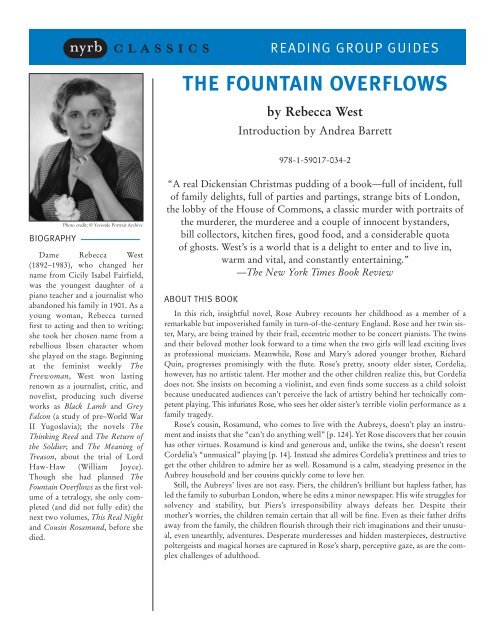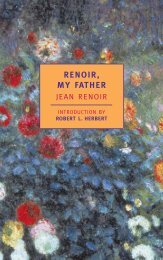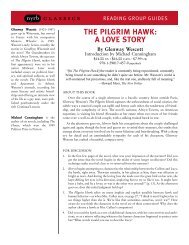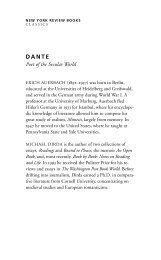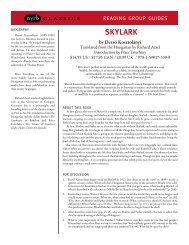THE FOUNTAIN OVERFLOWS - The New York Review of Books
THE FOUNTAIN OVERFLOWS - The New York Review of Books
THE FOUNTAIN OVERFLOWS - The New York Review of Books
Create successful ePaper yourself
Turn your PDF publications into a flip-book with our unique Google optimized e-Paper software.
BIOGRAPHY<br />
nyrb<br />
Photo credit: © Yevonde Portrait Archive<br />
Dame Rebecca West<br />
(1892–1983), who changed her<br />
name from Cicily Isabel Fairfield,<br />
was the youngest daughter <strong>of</strong> a<br />
piano teacher and a journalist who<br />
abandoned his family in 1901. As a<br />
young woman, Rebecca turned<br />
first to acting and then to writing;<br />
she took her chosen name from a<br />
rebellious Ibsen character whom<br />
she played on the stage. Beginning<br />
at the feminist weekly <strong>The</strong><br />
Freewoman, West won lasting<br />
renown as a journalist, critic, and<br />
novelist, producing such diverse<br />
works as Black Lamb and Grey<br />
Falcon (a study <strong>of</strong> pre–World War<br />
II Yugoslavia); the novels <strong>The</strong><br />
Thinking Reed and <strong>The</strong> Return <strong>of</strong><br />
the Soldier; and <strong>The</strong> Meaning <strong>of</strong><br />
Treason, about the trial <strong>of</strong> Lord<br />
Haw-Haw (William Joyce).<br />
Though she had planned <strong>The</strong><br />
Fountain Overflows as the first volume<br />
<strong>of</strong> a tetralogy, she only completed<br />
(and did not fully edit) the<br />
next two volumes, This Real Night<br />
and Cousin Rosamund, before she<br />
died.<br />
classics READING GROUP GUIDES<br />
<strong>THE</strong> <strong>FOUNTAIN</strong> <strong>OVERFLOWS</strong><br />
by Rebecca West<br />
Introduction by Andrea Barrett<br />
978-1-59017-034-2<br />
“A real Dickensian Christmas pudding <strong>of</strong> a book—full <strong>of</strong> incident, full<br />
<strong>of</strong> family delights, full <strong>of</strong> parties and partings, strange bits <strong>of</strong> London,<br />
the lobby <strong>of</strong> the House <strong>of</strong> Commons, a classic murder with portraits <strong>of</strong><br />
the murderer, the murderee and a couple <strong>of</strong> innocent bystanders,<br />
bill collectors, kitchen fires, good food, and a considerable quota<br />
<strong>of</strong> ghosts. West’s is a world that is a delight to enter and to live in,<br />
warm and vital, and constantly entertaining.”<br />
—<strong>The</strong> <strong>New</strong> <strong>York</strong> Times Book <strong>Review</strong><br />
ABOUT THIS BOOK<br />
In this rich, insightful novel, Rose Aubrey recounts her childhood as a member <strong>of</strong> a<br />
remarkable but impoverished family in turn-<strong>of</strong>-the-century England. Rose and her twin sister,<br />
Mary, are being trained by their frail, eccentric mother to be concert pianists. <strong>The</strong> twins<br />
and their beloved mother look forward to a time when the two girls will lead exciting lives<br />
as pr<strong>of</strong>essional musicians. Meanwhile, Rose and Mary’s adored younger brother, Richard<br />
Quin, progresses promisingly with the flute. Rose’s pretty, snooty older sister, Cordelia,<br />
however, has no artistic talent. Her mother and the other children realize this, but Cordelia<br />
does not. She insists on becoming a violinist, and even finds some success as a child soloist<br />
because uneducated audiences can’t perceive the lack <strong>of</strong> artistry behind her technically competent<br />
playing. This infuriates Rose, who sees her older sister’s terrible violin performance as a<br />
family tragedy.<br />
Rose’s cousin, Rosamund, who comes to live with the Aubreys, doesn’t play an instrument<br />
and insists that she “can’t do anything well” [p. 124]. Yet Rose discovers that her cousin<br />
has other virtues. Rosamund is kind and generous and, unlike the twins, she doesn’t resent<br />
Cordelia’s “unmusical” playing [p. 14]. Instead she admires Cordelia’s prettiness and tries to<br />
get the other children to admire her as well. Rosamund is a calm, steadying presence in the<br />
Aubrey household and her cousins quickly come to love her.<br />
Still, the Aubreys’ lives are not easy. Piers, the children’s brilliant but hapless father, has<br />
led the family to suburban London, where he edits a minor newspaper. His wife struggles for<br />
solvency and stability, but Piers’s irresponsibility always defeats her. Despite their<br />
mother’s worries, the children remain certain that all will be fine. Even as their father drifts<br />
away from the family, the children flourish through their rich imaginations and their unusual,<br />
even unearthly, adventures. Desperate murderesses and hidden masterpieces, destructive<br />
poltergeists and magical horses are captured in Rose’s sharp, perceptive gaze, as are the complex<br />
challenges <strong>of</strong> adulthood.
nyrb<br />
O<strong>THE</strong>R NYRB CLASSICS OF<br />
INTEREST<br />
Letty Fox: Her Luck<br />
Christina Stead<br />
(introduction by Tim Parks)<br />
A High Wind in Jamaica<br />
Richard Hughes<br />
(introduction by Francine Prose)<br />
<strong>The</strong> Go-Between<br />
L. P. Hartley<br />
(introduction by Colm Tóibín)<br />
Eustace and Hilda<br />
L. P. Hartley<br />
(introduction by Anita Brookner)<br />
SUGGESTIONS FOR<br />
FUR<strong>THE</strong>R READING<br />
Elizabeth Bowen, <strong>The</strong> House in<br />
Paris<br />
Henry Roth, Call It Sleep<br />
Christina Stead, <strong>The</strong> Man Who<br />
Loved Children<br />
classics READING GROUP GUIDES<br />
FOR DISCUSSION<br />
1. <strong>The</strong> Fountain Overflows is a semi-autobiographical novel that echoes many <strong>of</strong> the<br />
events and individuals <strong>of</strong> Rebecca West’s childhood. In particular, the character <strong>of</strong> Cordelia<br />
is based on West’s older sister, Letitia Fairfield, who hated the novel and her depiction in it.<br />
Yet West had dedicated the book to her. Is Cordelia as despicable as Rose thinks she is? Is<br />
Cordelia treated fairly by her sisters and her mother?<br />
2. What is the role <strong>of</strong> art in this novel? For example, what is the conflict between Cordelia’s<br />
idea <strong>of</strong> music and her mother’s?<br />
3. <strong>The</strong> spectral horses, raging poltergeists, and Rose’s ability to read minds appear rather<br />
unexpectedly in an otherwise realistic narrative. What is the effect <strong>of</strong> having these elements<br />
in the novel? Why might West have included them?<br />
4. West has been called a “stern moralist” and, as Andrea Barrett points out in her introduction,<br />
<strong>The</strong> Fountain Overflows <strong>of</strong>ten shows the conflict between good and evil within the<br />
characters themselves. How does West address moral questions through the Aubrey family?<br />
How does Piers’s ethical code differ from that <strong>of</strong> his wife?<br />
5. Do you sympathize with Piers’s irresponsibility? Is he right to be willing to go to jail for<br />
Queenie’s cause? Does his departure at the end <strong>of</strong> the book change your feelings about his<br />
earlier actions?<br />
6. Do you think Mrs. Aubrey brings her children up correctly and treats her husband well?<br />
How would you assess the balance <strong>of</strong> power in the Aubreys’ marriage?<br />
7. Rosamund stammers, isn’t conventionally clever, and can’t play an instrument, but she<br />
can beat Mr. Aubrey at chess and has a keen understanding <strong>of</strong> music and people. In the subsequent<br />
volumes <strong>of</strong> West’s tetralogy, Rosamund becomes an increasingly important character;<br />
the third book is entitled Cousin Rosamund. Why is Rosamund so special? What does<br />
her name (Rose-<strong>of</strong>-the-world) illuminate about her relationship to Rose, the narrator and<br />
heroine?<br />
8. West had written for a feminist journal and, as a young woman, was an ardent feminist.<br />
In what ways does the novel reveal feminist concerns or insights? How are they expressed?<br />
Is this effective?<br />
9. <strong>The</strong> Fountain Overflows chronicles the Aubreys’ descent into genteel poverty. In this<br />
they are the mirror image <strong>of</strong> the “common” but rich Phillips family. What role does class<br />
play in the novel? Does West confound or reinforce your earliest impressions <strong>of</strong> such lowerclass<br />
characters as Miss Beevor and Aunt Lily?


